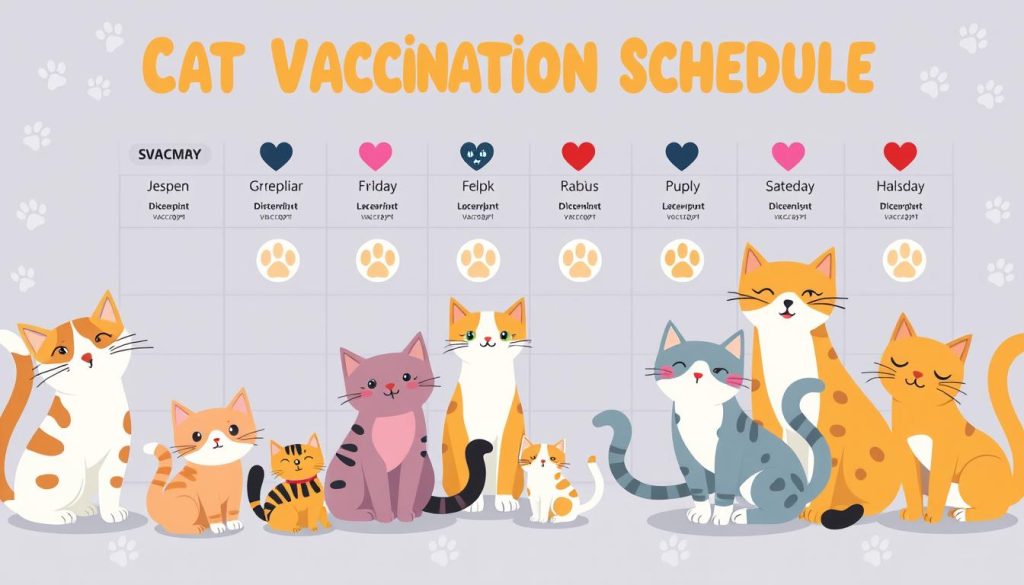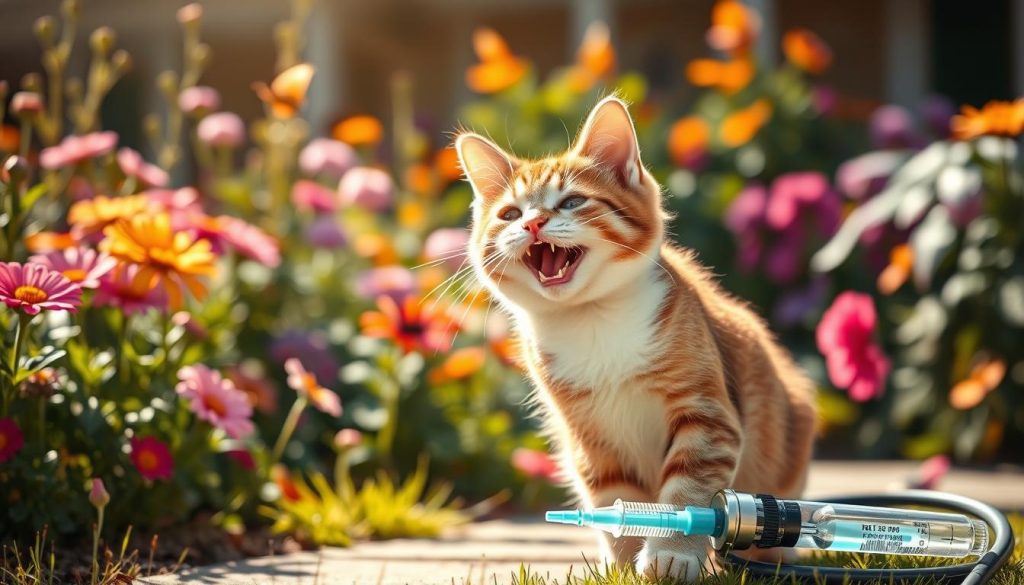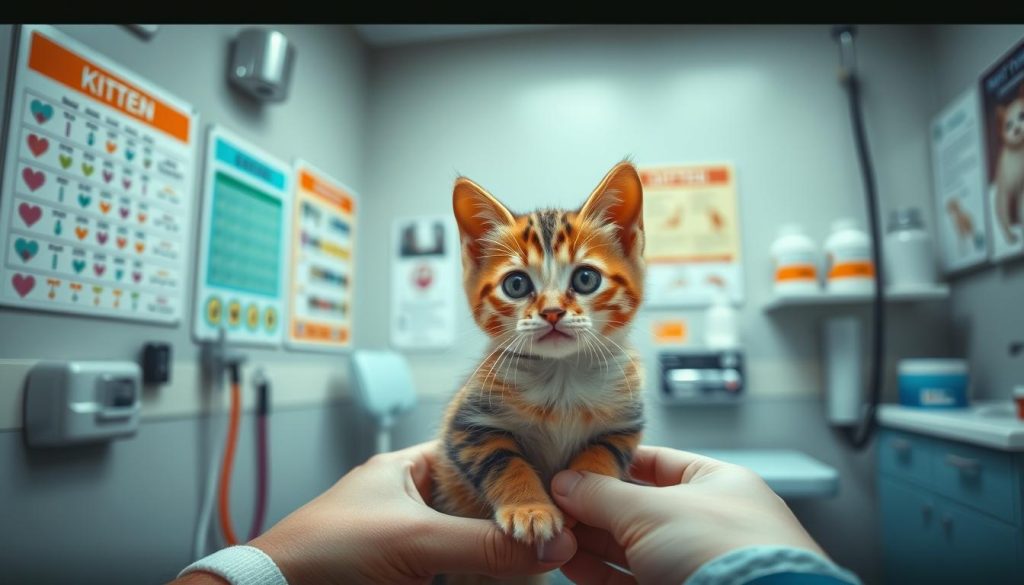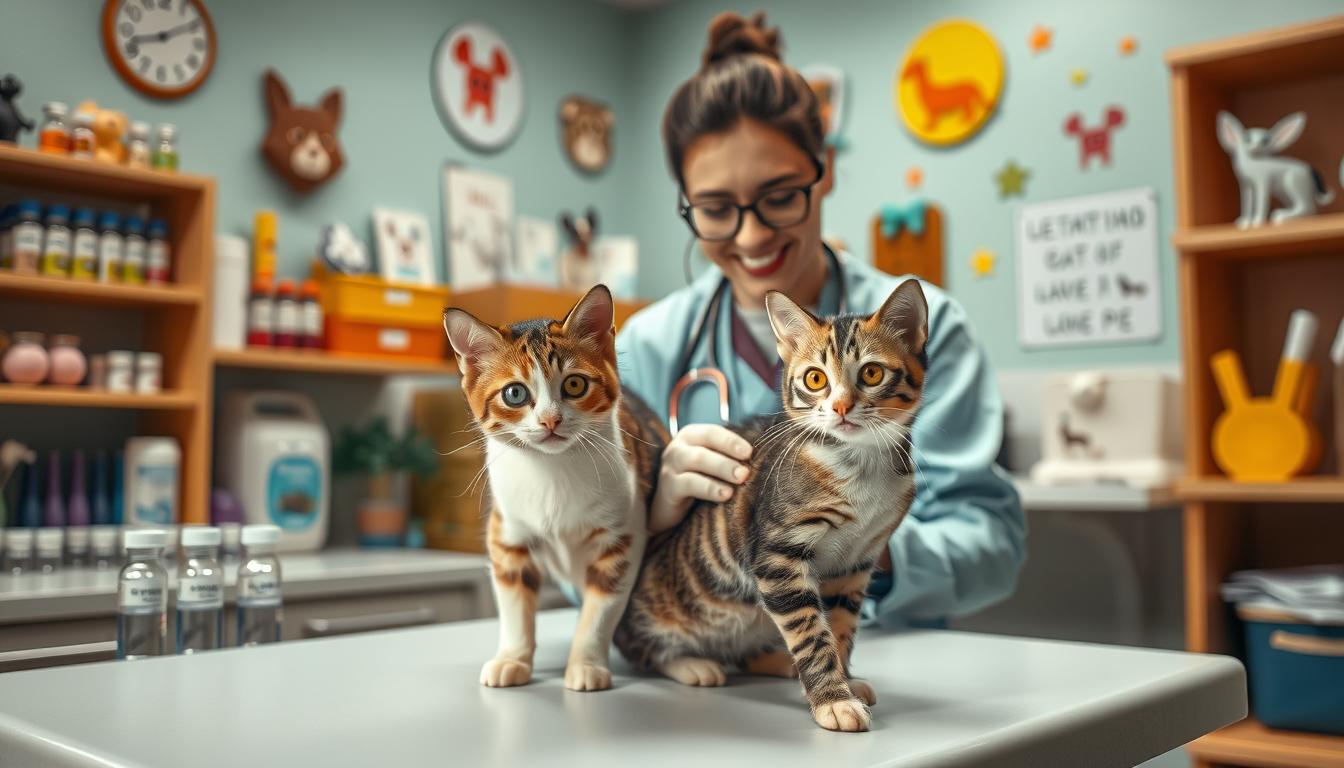As a devoted cat parent, I always put my feline friend’s health first. Keeping up with their vaccination schedule is key. Cat vaccinations protect them from serious diseases.
In this guide, I’ll explain why vaccinations are important. I’ll also cover the essential shots and schedules. This will help keep my furry friend safe and healthy.
Understanding the Importance of Cat Vaccinations
Vaccinations are key to your cat’s health. They help your cat’s body fight off harmful germs and viruses. This keeps your cat safe from serious diseases like feline distemper and rabies.
Protecting Against Feline Diseases
Getting your cat vaccinated lowers their chance of getting sick. Vaccines give your cat the protection they need. This means they can live a longer, happier life.
Building a Strong Immune System
Vaccines make your cat’s immune system stronger. A strong immune system helps your cat fight off sicknesses better. This is a big step in keeping your cat healthy for years to come.
| Vaccination | Purpose | Importance |
|---|---|---|
| Feline Distemper | Protects against a highly contagious viral disease | Can be fatal if left untreated |
| Feline Calicivirus | Prevents a common respiratory infection | Can cause severe symptoms and complications |
| Rabies | Safeguards against a deadly viral disease | Transmittable to humans and other animals |
By focusing on cat vaccinations, you’re showing you care about your cat’s health. This investment in their care can lead to a happier, healthier life for your cat.
Core Vaccines Every Cat Needs

Keeping your cat healthy is very important. There are key vaccines every cat needs. These vaccines protect against serious diseases.
The feline distemper vaccine is a must. It protects against panleukopenia, calicivirus, and rhinotracheitis. Kittens get this vaccine at 6-8 weeks old. They need booster shots later to stay protected.
The rabies vaccine is also crucial. It keeps your cat and family safe from rabies. This is a fatal disease that can spread to humans.
How often your cat needs these vaccines depends on their age and lifestyle. Always talk to your vet to make a plan. This way, you can keep your cat safe from many diseases.
| Vaccine | Purpose | Recommended Schedule |
|---|---|---|
| FVRCP (Feline Distemper) | Protects against panleukopenia, calicivirus, and rhinotracheitis | Kitten shots starting at 6-8 weeks, with boosters every 3-4 weeks until 16 weeks old. Annual boosters for adult cats. |
| Rabies | Protects against the fatal rabies virus | First shot at 12-16 weeks, with annual boosters. |
Cat Vaccinations: A Preventive Healthcare Measure

Keeping your cat healthy and happy is very important. Making sure they get their vaccinations is a key part of this. Vaccines help protect your cat from serious diseases and can save you money in the long run.
Reducing Veterinary Costs
Treating serious illnesses in cats can be very expensive. But, getting your cat vaccinated can prevent these costly conditions. This way, you can save money and have peace of mind knowing your cat is safe.
Ensuring a Longer, Healthier Life
Vaccinated cats usually live longer and healthier lives. Vaccines help protect them from diseases that could weaken their health. This means your cat can stay strong and enjoy a better quality of life.
Getting your cat vaccinated is a smart choice for their health. It helps them live a long, happy life with you.
Kitten Vaccination Schedule: Safeguarding Your Furry Companion

As a devoted pet parent, it’s crucial to get your kitten vaccinated on time. This is key for their health and well-being. The kitten vaccination schedule is a vital part of keeping your pet safe from serious diseases.
Kittens usually start their vaccinations at 6-8 weeks old. They get the FVRCP (Feline Viral Rhinotracheitis, Calicivirus, and Panleukopenia) vaccine and the rabies vaccine. These shots are given every 3-4 weeks until they are 16 weeks old.
- 6-8 weeks: FVRCP and rabies vaccines
- 10-12 weeks: FVRCP and rabies booster shots
- 14-16 weeks: FVRCP and rabies booster shots
Sticking to this kitten vaccination schedule is vital for your kitten’s health. Talk to your vet to make a cat shots timeline that fits your kitten’s needs. This ensures they get the best feline preventive care.
| Vaccine | Schedule | Purpose |
|---|---|---|
| FVRCP | 6-16 weeks, every 3-4 weeks | Protects against feline viral rhinotracheitis, calicivirus, and panleukopenia |
| Rabies | 6-16 weeks, every 3-4 weeks | Protects against the deadly rabies virus |
Maintaining Your Cat’s Vaccination Records
Keeping your cat’s vaccination records up to date is key for their health. Your vet will give you a vaccination certificate. It shows the shots your cat has had, when they were given, and when the next one is needed. I always keep this important paper safe and take it to vet visits.
Having these cat vaccination records helps your cat get the right follow-up care. It also lowers the chance of missing or late vaccinations. Keeping this feline health documentation handy helps me manage my pet’s preventive care. This is vital for their long-term health. It gives me peace of mind and helps me care for my cat the best way.
I strongly suggest keeping detailed records of your cat’s vaccinations. This simple action can greatly improve your pet’s health and life span. By being organized and proactive, I can ensure my cat gets the care they need to live well.

